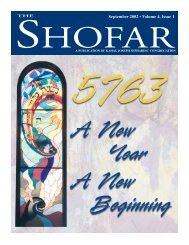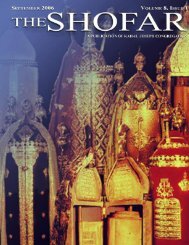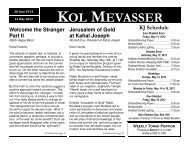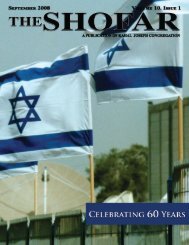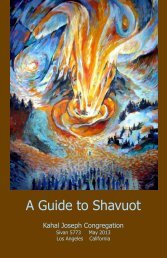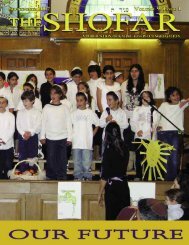09 - 2001.pdf - Kahal Joseph
09 - 2001.pdf - Kahal Joseph
09 - 2001.pdf - Kahal Joseph
Create successful ePaper yourself
Turn your PDF publications into a flip-book with our unique Google optimized e-Paper software.
Gates That Close...<br />
Gates that Close and Gates that Open<br />
By: Rabbi Yosef Benarroch<br />
Sephardic Educational Center<br />
Jerusalem<br />
Life, our Rabbis tell us, is a series of stages we pass through, shedding the old and donning the<br />
new. More than any day of the year we are reminded of those stages on Yom Kippur during the<br />
closing prayers of Neilah. Our Rabbi’s tell us that, as Yom Kippur fades, the imagery is one of closing<br />
gates. The very word Neilah means to close or to lock. This, in essence, is the last opportunity.<br />
Sephardim begin the Neilah with a very special prayer. Here is an excerpt from it.<br />
“EL NORA ALILA, EL NORA ALILA, HAMTZI LANU MEHILA BE SHAAT HA NEILAH”<br />
G-d of awe, G-d of might; G-d of awe, G-d of might: as the gates close this night, may we all, old<br />
and young, look for gladness and delight in the many years to come, as the gates close tonight<br />
Neilah is about gates that close, but a careful reading of this prayer reveals gates that also open.<br />
The prayer speaks of closing gates and then, in the same vein, speaks of looking for gladness and<br />
delight in the years to come. This prayer is about the many stages of our lives, it attunes us to the<br />
many gates that close and open during our journey in this world. Is that not what life is, a sequence<br />
of opportunities that we either seize or we let slip through our fingertips? We ask G-d that, as we<br />
pass through life and as gates close, He will please open others for us.<br />
The central Mizva of Rosh Hashanah and Yom Kippur is Teshuva (repentance). Literally, it<br />
means to return. What Teshuva tells us is that we are not completely on the correct path. Somehow<br />
we have strayed and we must return. It is a Mizva that tells us that we are not yet where we want<br />
to be, that something is still missing from the kind of person we want to be. When we think of<br />
Teshuva we remind ourselves that as good as fathers/mothers, as good as husbands/wives, as good<br />
as person, as good as Jews that we are, we can still be better. We have strayed a bit and we must<br />
get back on the correct path.<br />
The word for sin in Hebrew is “Het”. It is not an easy word to translate, but I finally understood<br />
it one day as I was taking a walk in Jerusalem. Suddenly I heard the yells of little children; they were<br />
yelling the word “Het”. Not knowing what was happening I came closer to see. To my surprise they<br />
were playing a game of soccer. Every time a person would kick the ball and miss the net they yelled<br />
“Het”. I learned that to these children the word “Het” means to miss the mark. In essence, that is<br />
what a sin is: missing the mark. We had the opportunity to do something good and beautiful but,<br />
instead, we sinned. We literally missed the mark.<br />
To return and do Teshuva, we need real courage. It requires us to close a gate behind us. We<br />
must tell ourselves that we will never walk through that door again. But, as we close a door behind<br />
us, we ask that a new one appear. The winds of change must take us through a new door.<br />
I remember once hearing a story about the great inventor Thomas Edison. In 1914, the building<br />
that housed his laboratory burned down. The building was worth $2 million, but he got only<br />
$250,000 from the insurance company. As his life’s work went up in smoke, his son Charles was<br />
looking frantically for him. Upon finding his father, he was told to quickly get his mother. With his<br />
family together witnessing the tragedy of the fire, this is what Thomas Edison had to say to them:<br />
“There is great value in disaster. All our mistakes are burned up. Thank G-d we can start anew.”<br />
Three weeks later Thomas Edison invented the phonograph.<br />
The sequence of the three holidays of this season reflects this same theme. We begin with Rosh<br />
Hashana, move to Yom Kippur, and end with Sukkot and Simhat Torah. Rosh Hashana and Yom<br />
Kippur as we have seen are holidays that force us to introspect. They make us move inward and<br />
confront gates we must close. Sukkot is just the opposite. It is a festival whose central theme is not<br />
8



